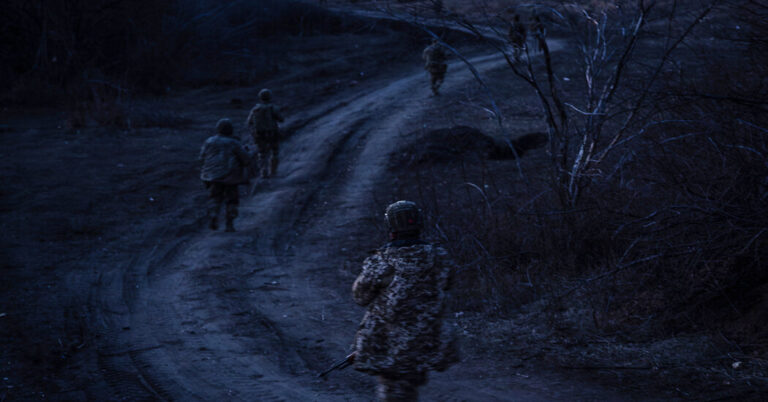For Ukraine, a peace deal with Russia is not just about stopping the war. A deal should also prevent the next one — by convincing Russia that its invasion was a costly failure.
In that context, the past week brought a lot of bad news for Ukraine. American officials conceded that Ukraine would not reclaim all of its territory or join NATO. They also said that U.S. troops would not help protect Ukraine’s borders after the war.
Maybe a truce would have eventually included those conditions. But by granting them now, the concessions push a peace deal in Russia’s favor — and may get Vladimir Putin to think that, after all of this, the war was worth the costs. “The United States is intent on ending this war,” said my colleague Julian Barnes, who covers international security. “And ending it quickly likely means trying to end it on Russia’s terms.”
Today’s newsletter looks at why Ukraine is increasingly concerned about a future Russian invasion.
Imposing costs
Since the beginning of the war, Ukraine has worried that an eventual cease-fire will simply give Russia time to rebuild and come back. So Ukraine and its allies have tried to prevent this scenario through two approaches.
First, they have tried to make the war as costly as possible for Russia. On the diplomatic front, Ukraine’s allies have imposed economic sanctions on Russia. On the battlefield, Russia has lost hundreds of thousands of soldiers to death and injuries. At the same time, Ukraine has tried to retake as much territory as possible. If Russia ended the war with an economy in ruins, a colossal death toll and little new territory, it would likely look at the invasion as a mistake.
Second, Ukraine and its allies have fortified their alliances. The United States and Europe have shown their commitment to Ukraine by sending hundreds of billions of dollars in aid. Ukraine moved to join the European Union, and it wants to join NATO. A solitary Ukraine can’t fight off Russia, but a united West can.
But these approaches haven’t worked as hoped. Russia’s economy has held up surprisingly well (with China’s help). And while Putin’s armies did not manage to take Kyiv or topple the country’s government, Russia still holds about 20 percent of Ukraine, including the Russian-speaking Donbas and Crimea regions.
The U.S.-Ukraine alliance is also falling apart. President Trump’s unsolicited concessions show that America is not willing to fight as hard for Ukraine as it once was. Meanwhile, Trump has demanded that Ukraine give up its natural resources in exchange for U.S. aid and security guarantees. And he has made hostile comments about Ukraine. Yesterday, he falsely blamed it for the war. “You should have never started it,” Trump said.
For Putin, these are all signs that Ukraine’s biggest supporter won’t be there for a second round of war.
Absent America
Without the United States, Ukraine would have to rely on European support to stand against Russia.
In theory, Europe is big enough to keep Ukraine afloat in the current war. “If Europe were to get together and focus on providing artillery rounds, air defense ammunition and support for Ukraine’s domestic drones, that would allow Ukraine to hold their lines,” Julian said.
But Europe is divided, as my colleague Mark Landler reported. Consider European leaders’ recent talks about deploying soldiers in Ukraine after the war: France supported the idea. Britain conditioned its deployment on American backup. Poland said it needed to keep its forces at home to defend its own borders from Russia. Germany said these discussions were premature.
None of this inspires much confidence for Ukraine. The West has fractured and Putin knows it.
More coverage
THE LATEST NEWS
Trump’s Government Overhaul
More on the Trump Administration
Opinions
The international community should impose sanctions on Rwanda for its support of armed groups in the Democratic Republic of Congo, as it did in 2012, Denis Mukwege writes.
Bret Stephens criticizes Vice President JD Vance for meeting with the leader of the far-right Alternative for Germany party.
The Great Read of the day: She became the America’s leading art consultant and drew her clients close. Then she stole millions from them.
Letter of Recommendation: Euston Road is London’s most despised thoroughfare. Consider a visit.
Ask Well: “Do women need more sleep than men?”
Lives Lived: Dickson Despommier was a microbiologist who proposed that cities should grow food in high-rises, popularizing the term “vertical farming” — an idea that became a reality around the globe. He has died at 84.
SPORTS
M.L.B.: The Blue Jays and young star Vladimir Guerrero Jr. were unable to agree on a contract extension before the season begins.
New York Mets: Juan Soto told reporters yesterday his new team gives him “the best chance to win,” which miffed his former Yankees teammate Aaron Judge.
N.F.L.: The Athletic released its list of the top 50 coaches, agents and media members under age 40 this morning. See the names.
ARTS AND IDEAS
A new generation of female artists is reinventing R&B. Some are reviving the genre’s gospel roots; others are imbuing the form with hip-hop and global influences. All are looking backward without getting stuck in the past. Read interviews with some of the artists, and listen to nine songs that define R&B’s new era.

